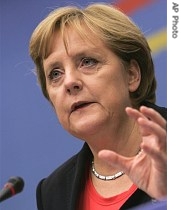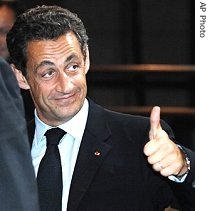2007年VOA标准英语-EU Crafts New Treaty in Last-Minute Compromise(在线收听)
Brussels
23 June 2007
After an all-night round of negotiations, leaders of the European Union agreed early Saturday morning on the basic outline of a new treaty reforming EU rules and institutions. The agreement is considered another triumph for German Chancellor Angela Merkel, who earlier this month hosted a G8 summit that reached a compromise on climate change. Teri Schultz reports for VOA from Brussels, that Mrs. Merkel was determined to conclude her country's rotating presidency of the EU with an agreement.
 |
| German Chancellor Angela Merkel gestures while speaking during a final media conference at an EU summit in Brussels, 23 Jun 23 2007 |
"The possibility of compromise was stretched to the limit, but we've managed it and so we are very, very satisfied with what we have managed to conclude this morning," she said.
Poland had threatened a veto, because of its concern that changes in the voting system would favor members with larger populations. After a day and a half of negotiations failed to convince the Poles to accept alternative language, Ms. Merkel said late Friday that she was ready to move forward with or without Warsaw.
That provoked the Czech Republic and Lithuania to say they support Poland and to launch the new French President Nicolas Sarkozy into the role of mediator.
 |
| French President Nicolas Sarkozy gives the thumbs up as he leaves an EU summit in Brussels, 23 Jun 2007 |
Mr. Sarkozy managed to forge a compromise agreeable to all sides. Polish President Lech Kaczynski accepted a delayed implementation, until 2014, of the new voting system and, with the change, he asserted that his country's concerns had been met.
"This is our main success and this is the subject of the most fervent hot disputes during this Council," he said.
Other member states had other criticisms of the proposed treaty, with outgoing Prime Minister Tony Blair leading the opposition to a new position for a foreign minister of the EU. Mr. Blair said that would impinge on member states' sovereignty.
In the end, the post will exist - along with a permanent presidency - rather than the current rotating one. The title for now will be the "High Representative of the European Union for Foreign Policy, Defense and Security." The new position will combine those currently held by Javier Solana, as the High Representative for Foreign and Security Policy, and Benita Waldner, the Commissioner for External Affairs.
Wrapping up the summit Saturday morning, European Commission President Jose Manuel Barroso joined Chancellor Merkel in expressing relief and satisfaction with a deal that seemed impossible until almost the last moment.
"I have to say honestly that maybe it is not the most beautiful lyrics, the text we have adopted, but I am sure it will be efficient prose," he said.
Mr. Barroso gave Ms. Merkel a bouquet along with words of appreciation for her fortitude in working to hammer out the "eleventh-hour" compromise.
The EU intends to have a treaty completed by the end of the year, with final ratification by all 27-member states by 2009.